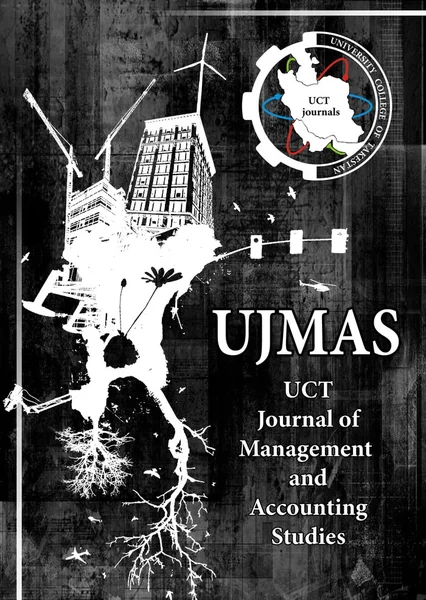-
evaluating the possibility of establishing knowledge management in state welfare organization of iran
جزئیات بیشتر مقاله- تاریخ ارائه: 1400/08/01
- تاریخ انتشار در تی پی بین: 1400/08/01
- تعداد بازدید: 536
- تعداد پرسش و پاسخ ها: 0
- شماره تماس ژورنال: 348136784
today, knowledge is seen as the only assuring source of a competitive constant merit for organizations. organizations have realized that their knowledge of methods for accomplishing tasks and of providing services is an important asset to be managed like their other valuable assets. in other words, organizational knowledge is a value-producing resource (for the beneficiaries) and an instrument in producing a product and in providing innovative services to attain and retain competitive constant merit. before exercising knowledge management, vast studies on the field seem necessary. in doing so, this research has been done with the purpose of evaluating the possibility of establishing the knowledge management in state welfare organization of iran (swoi). for this study, descriptive research method was used for gathering data. in doing so, 208 managers and experts from swoi were selected using stratified random sampling method; and, they answered 80 question questionnaire. this instrument was developed based on research literature and by the researcher. its content validity has been approved by the experts. the reliability (cronbach's coefficient alpha) of all the factors was more than 0.7 which is in an acceptable limit. after performing shapiro and wilk test and after being sure that data are normally distributed, results from data analysis using one sample t test showed that from 7 factors of bukowitz and williams knowledge management model, conditions of 6 factors (finding, use, learning, evaluation, development /maintenance, and the removal of the knowledge) of the research hypotheses are not acceptable and only knowledge sharing and exchanging calculated average, 3.18, is above the average line. moreover, there is no significant difference, (p>0.05), observed among subjectsʼ averages based on cognitive factors of sex, position, etc. but there is a significant difference, (p<0.05), in education level variable in indices of knowledge finding, knowledge learning, and removal of knowledge. effect size index, too, shows that the biggest difference is related to subscale of removal of knowledge. finally, we can evaluate conditions of processes necessary for establishing knowledge management in iran as not acceptable which makes it as a necessity for those in charge to pay attention to it. at the end of the research, applied suggestions are provided too.
حوزه های تحت پوشش ژورنال
مقالات جدیدترین رویدادها
-
استفاده از تحلیل اهمیت-عملکرد در ارائه الگوی مدیریت خلاقیت سازمانی و ارائه راهکار جهت بهبود
-
بررسی تاثیر ارزش وجوه نقد مازاد بر ساختار سرمایه شرکت های پذیرفته شده در بورس اوراق بهادار تهران
-
بررسی تأثیر سطح افشای ریسک بر قرارداد بدهی شرکت های پذیرفته شده در بورس اوراق بهادار تهران
-
بررسی تأثیر رتبه بندی اعتباری مبتنی بر مدل امتیاز بازار نوظهور بر نقد شوندگی سهام با تأکید بر خصوصی سازی شرکت ها
-
تأثیر آمیخته بازاریابی پوشاک ایرانی بر تصویر ذهنی مشتری پوشاک ایرانی (هاکوپیان)
-
تاثیر خاک رس بر رفتار مواد زاید شهری
-
طراحی و ارائه مدل مفهومی توسعه یادگیری سازمانی با بهره گیری از سرمایه اجتماعی
-
بررسی نقش محوطه های بازی در رشد و خلاقیت کودکان
-
معرفی مولفه های معماری بومی بافت سنتی یزد
-
نقش گیاهان دارویی در توسعه روستاهای کشور ایران
مقالات جدیدترین ژورنال ها
-
مدیریت و بررسی افسردگی دانش آموزان دختر مقطع متوسطه دوم در دروان کرونا در شهرستان دزفول
-
مدیریت و بررسی خرد سیاسی در اندیشه ی فردوسی در ادب ایران
-
واکاوی و مدیریت توصیفی قلمدان(جاکلیدی)ضریح در موزه آستان قدس رضوی
-
بررسی تاثیر خلاقیت، دانش و انگیزه کارکنان بر پیشنهادات نوآورانه کارکنان ( مورد مطالعه: هتل های 3 و 4 ستاره استان کرمان)
-
بررسی تاثیر کیفیت سیستم های اطلاعاتی بر تصمیم گیری موفق در شرکتهای تولیدی استان اصفهان (مورد مطالعه: مدیران شرکتهای تولیدی استان اصفهان)
-
بررسی نوگرایی نقاشی در ایران معاصر
-
بررسی تأثیر تعهد مدیریت به بازاریابی داخلی بر نگرش کاری کارکنان با نقش واسطه ای ارتباطات داخلی رسمی و غیررسمی (مورد مطالعه: بانک صنعت و معدن)
-
بهبود قابلیت اطمینان نقاط بار مشترکین براساس مدل احتمالاتی برای سیستم حفاظتی میکروشبکه مبتنی بر الگوریتم هوشمند هایبرید خفاش و نلدرمید
-
تدوین استانداردهای حسابداری با رویکرد مدل کسب و کار: وضعیت موجود و افق پیش رو
-
طراحی مدل فرا ابتکاری هوش مصنوعی – ژنتیک تابع بقا ریسک اعتباری بانک رفاه (مطالعه موردی: شعب غرب شهر تهران)


سوال خود را در مورد این مقاله مطرح نمایید :